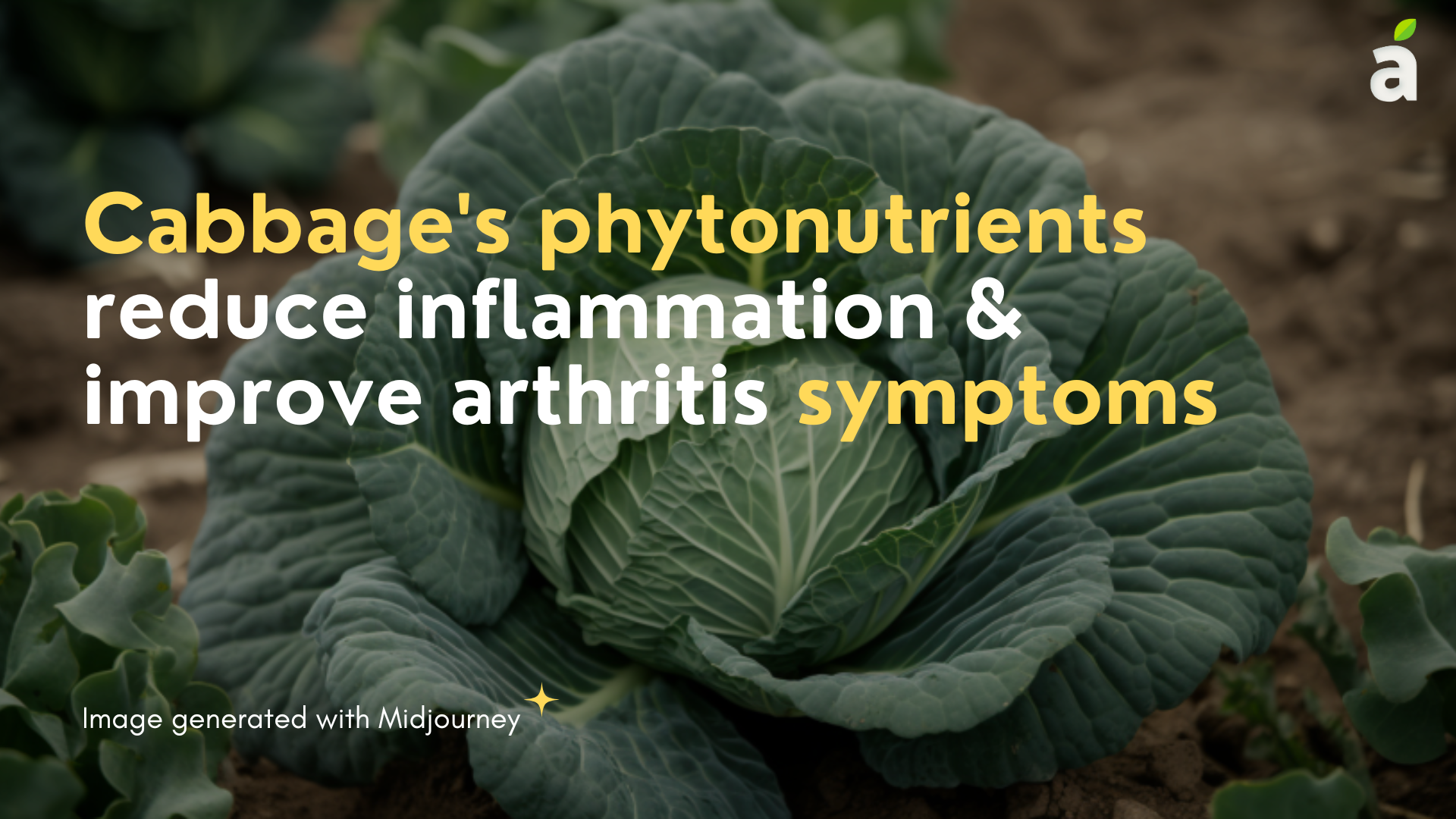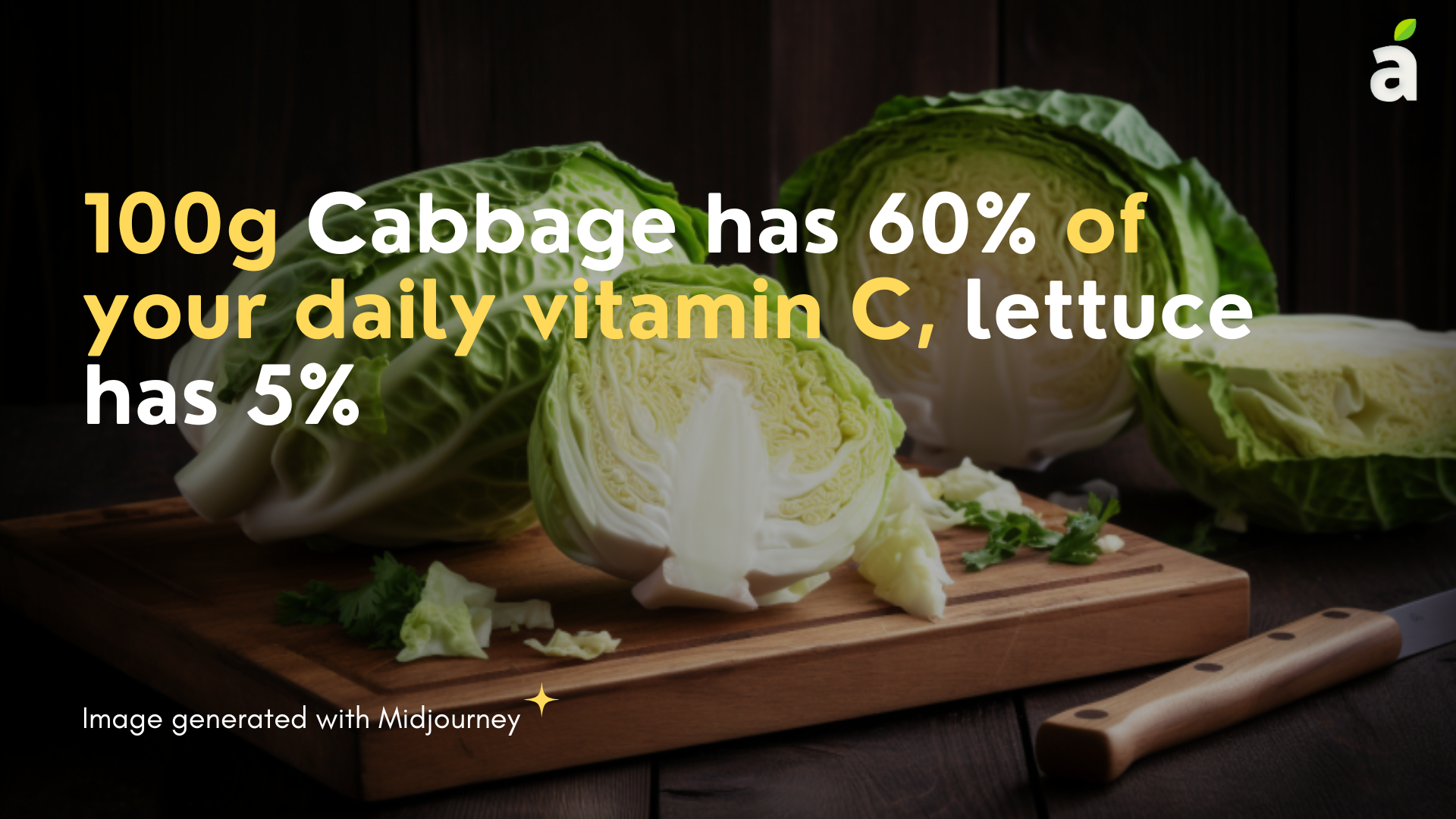Published Date January 24, 2003
Cabbage: A Cruciferous Wonder
By Naurin Ansari
3 min read
Last update date: January 24, 2003

Cabbage, a versatile and nutritious vegetable, has been enjoyed in various cuisines worldwide for centuries. With its crisp texture and mild flavour, cabbage not only adds depth to dishes but also offers a plethora of health benefits.
In this blog, we will explore the advantages of cabbage, its potential side effects, its impact on weight loss, and how it compares to its leafy counterpart, lettuce.
Benefits of Cabbage
Cabbage, as a cruciferous vegetable, offers a range of benefits because it is packed with antioxidants that combat chronic inflammation. Research has shown that incorporating cruciferous vegetables like cabbage into your diet can help reduce certain markers of inflammation in the blood.
Increase cabbage consumption to lower the risk of chronic diseases like diabetes, heart disease, and obesity due to its low starch, high nitrates, vitamin K, water, and fibre content. Moreover, these vegetables contribute to maintaining a healthy complexion, managing weight, and boosting energy levels.
Cabbages are particularly rich in phytonutrients that act as antioxidants, effectively reducing the risk of certain cancers. Red cabbage, in particular, contains anthocyanins, which are powerful antioxidants known for their health benefits.
Let's explore the specific advantages of cabbage:
- Nutrient-Rich: Cabbage is a nutritional powerhouse, providing essential vitamins like C, K, and B6 whilst providing minerals like manganese, potassium, and folate. These nutrients play a vital role in supporting overall health, boosting the immune system, and ensuring proper cellular function.
- Antioxidant Power: Cabbage is packed with potent antioxidants, including anthocyanins and glucosinolates. These antioxidants play a crucial role in protecting cells from oxidative stress and reducing the risk of chronic diseases such as cancer, heart disease, and inflammation.
- Anti-Inflammatory Properties: The phytonutrients present in cabbage possess remarkable anti-inflammatory properties. This means that cabbage can help alleviate symptoms of inflammatory conditions like arthritis and promote a healthy inflammatory response throughout the body.
- Digestive Health Support: Cabbage is an excellent source of dietary fibre, which is essential for maintaining a healthy digestive system. The fibre content aids in digestion promote regular bowel movements, and supports the growth of beneficial bacteria in the gut, contributing to a healthy gut microbiome. Additionally, the high fibre content of cabbage can help with weight management by increasing feelings of satiety
- Heart-Friendly: Cabbage contains high levels of potassium, a mineral that plays a crucial role in regulating blood pressure. By incorporating cabbage into your diet, you can help lower the risk of cardiovascular diseases. Furthermore, the fibre in cabbage helps to lower LDL (bad) cholesterol levels, promoting a healthy lipid profile.[1][2]
Side Effects of Cabbage
While cabbage offers numerous health benefits, it is important to be aware of potential side effects, especially when consumed in excess. Here are some considerations:
- Flatulence and Digestive Issues: Eating large amounts of cabbage can cause flatulence and digestive discomfort due to the presence of raffinose, an indigestible sugar. This can lead to symptoms such as bloating, belching, and even diarrhoea. To minimise these effects, thoroughly cooking or opting for fermented cabbage products may be helpful.
- Vitamin K and Blood Clotting: Cabbage is rich in vitamin K, which plays a vital role in blood clotting. While this is generally beneficial, individuals who are taking blood-thinning medications, such as warfarin, should be cautious with their cabbage intake.
- Goitrogens and Thyroid Function: Cabbage belongs to the cruciferous vegetable family, known for containing goitrogens. These compounds may interfere with thyroid function in some individuals when consumed in large quantities, particularly when consumed raw or uncooked. However, cooking cabbage can significantly reduce the goitrogenic effects, making it safe for most people.
It's worth mentioning that these potential side effects are generally observed when cabbage is consumed in excessive amounts or under specific circumstances. For most individuals, moderate consumption of cabbage as part of a well-balanced diet is considered safe and can provide numerous health benefits. As with any dietary considerations, it's advisable to listen to your body.[3]
Does Cabbage Reduce Weight?
Cabbage is a fantastic addition to your diet if you're aiming for beautiful skin and weight loss. With only 33 calories per cup of cooked cabbage, it is a low-calorie option that is high in fibre and low in fat. This combination makes it ideal for those looking to shed pounds while nourishing their body.
One of the reasons cabbage is beneficial for the skin is its antioxidant content, which includes vitamin C and beta-carotene. These antioxidants help protect the skin from damage caused by free radicals and promote a healthy complexion.
The low-calorie content of cabbage is advantageous for weight loss. By filling up on low-calorie foods like cabbage, you can reduce overall calorie intake, prompting your body to utilize energy stores for fuel.
Here are some key points to consider:
- Calorie Control: Cabbage's low-calorie count, around 25 calories per cup, makes it an excellent option for managing your weight. It's high water and fibre content contribute to feelings of fullness, helping control appetite and preventing overeating.
- Hydration and Detoxification: Cabbage's high water content not only helps keep you hydrated but also supports your body's natural detoxification processes. Proper hydration is essential for weight loss as it aids in maintaining optimal metabolism and digestion.
- Nutritional Value: Despite being low in calories, cabbage is rich in essential nutrients. By incorporating cabbage into your meals, you can ensure that your body receives vital vitamins, minerals, and antioxidants while effectively managing your weight.
Cabbage alone is not a magic solution for weight loss or flawless skin. It is important to maintain a well-rounded diet that includes a variety of nutrient-rich foods along with regular exercise and proper skincare practices.[4]
Is Cabbage Better for You than Lettuce?
While lettuce and cabbage may appear similar, they differ significantly in terms of nutritional composition. Cabbage, being more commonly found and utilized, is notably more nutrient-dense than its counterpart. In just 100 grams of cabbage, you can obtain approximately 60% of your daily Vitamin C needs, whereas lettuce offers less than 5%.
Additionally, cabbage provides Vitamin B6, which lettuce lacks. In summary, while both vegetables are high in fibre, cabbage surpasses lettuce in certain vitamin content. Cabbage and lettuce are both valuable additions to a nutritious diet, but they have distinct nutritional profiles.
While they share some similarities, such as being low in calories and rich in fibre, there are notable differences between them:
- Nutrient Content: Cabbage tends to have a higher concentration of nutrients, offering a broader range of vitamins and minerals compared to lettuce. It is particularly abundant in vitamins C, K, and B and minerals like potassium and manganese.
- Culinary Versatility: Cabbage is highly versatile in terms of cooking methods. It can be stir-fried, roasted, or incorporated into various dishes such as soups and stews. On the other hand, lettuce is primarily consumed raw in salads or used as a wrap for fillings.
It's important to note that both cabbage and lettuce are excellent sources of dietary fibre, which promotes healthy digestion and contributes to the feeling of fullness. Including a variety of vegetables in your diet, like cabbage and lettuce, can help ensure a well-rounded intake of essential nutrients. [5]
Takeaway
Cabbage is undoubtedly a valuable addition to a healthy diet, providing numerous health benefits and culinary versatility. From its nutritional content to its role in promoting heart health and aiding digestion, cabbage proves to be a nutrient-packed vegetable worth incorporating into your meals. Embrace its versatility and reap its range of benefits.
References
- https://www.organicfacts.net/health-benefits/vegetable/health-benefits-of-cabbage.html
- https://www.healthline.com/nutrition/benefits-of-cabbage#TOC_TITLE_HDR_3
- https://healthyeating.sfgate.com/negative-effects-cabbage-2960.html
- https://www.caloriesecrets.net/cabbage-and-weight-loss-does-it-really-burn-fat/
- https://spoonuniversity.com/lifestyle/we-did-an-kind-bar-iron-chef-competition-and-this-is-what-went-down
Choose Healthy With Us.
Know the real truth about your food. Stay informed and healthy, for free.

Download the App Now
Certified nutritionists trust our food recommendations. Safe to say, so can you :)










